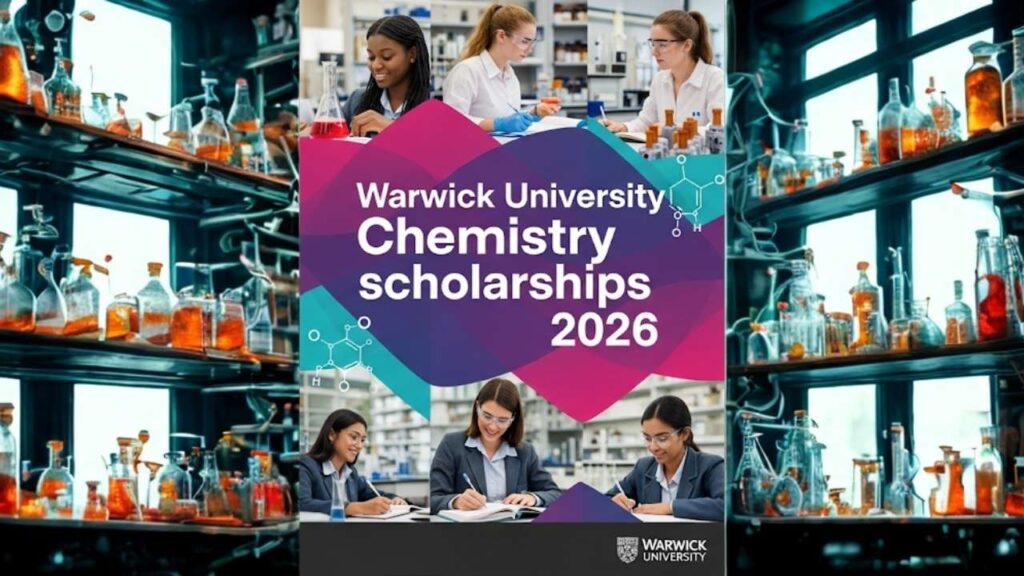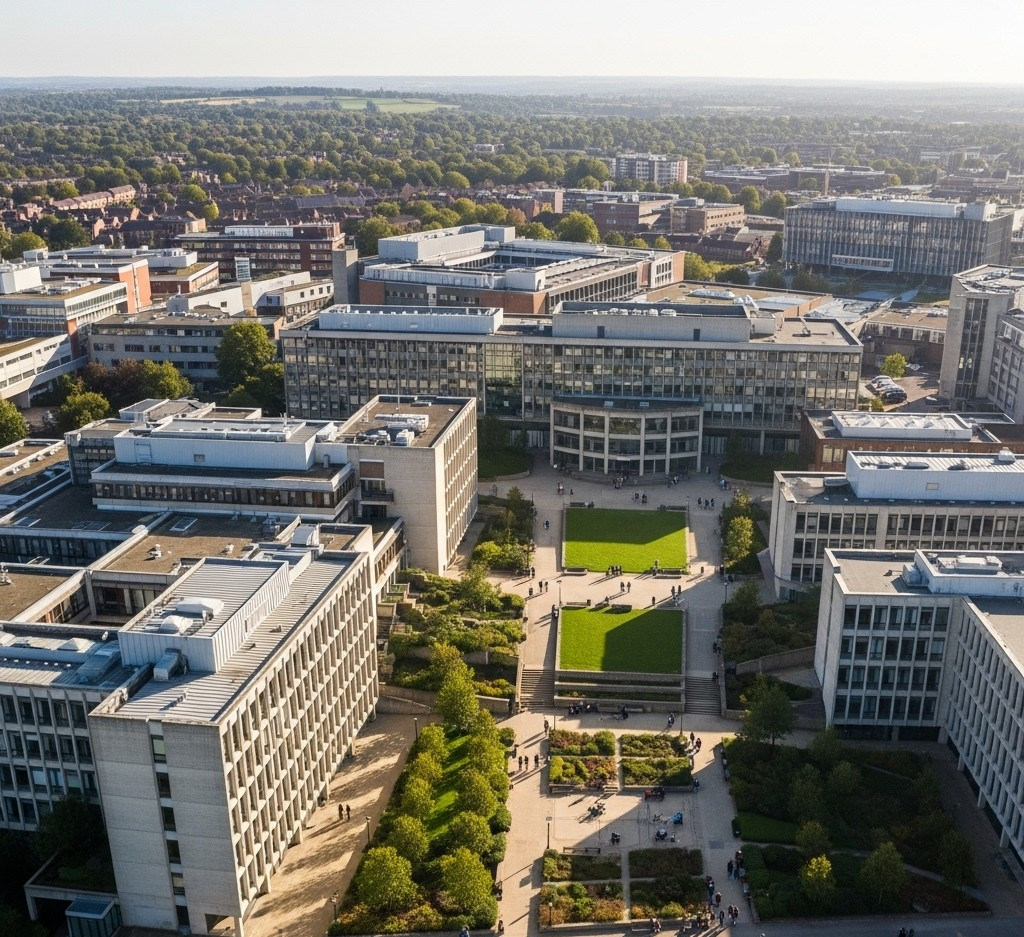Securing a spot in a world-class research program is a dream for any aspiring chemist. The Warwick University Chemistry scholarships for 2026 represent a golden ticket—an opportunity to conduct cutting-edge research within a globally respected department, fully funded. Navigating the application process can feel like a complex chemical reaction, with many variables to consider. But don’t worry. This guide is your catalyst, designed to break down the process into clear, manageable steps, giving you the confidence and knowledge to craft an application that stands out.

Why Choose Warwick for Your Chemistry PhD?
Choosing where to pursue your PhD is one of the most significant decisions of your academic career. The University of Warwick isn’t just a place to study; it’s a place to become part of a legacy of innovation and discovery.
The Department of Chemistry at Warwick is a powerhouse of research and teaching, consistently ranked among the top departments in the UK. It fosters a vibrant, supportive, and interdisciplinary environment where postgraduate researchers are considered junior colleagues, contributing directly to groundbreaking science.
Here’s what sets Warwick apart:
- World-Class Research: Warwick Chemistry is renowned for its excellence across key research areas, including materials chemistry, chemical biology, synthesis, and measurement. You’ll be working alongside world-leading academics on projects that have a real-world impact.
- State-of-the-Art Facilities: The department boasts an impressive suite of modern equipment and facilities, including the latest in NMR and mass spectrometry, X-ray diffraction, and advanced microscopy. You’ll have the tools you need to push the boundaries of science.
- A Collaborative Community: The culture at Warwick is built on collaboration. You’ll be part of a dynamic research community, sharing ideas not just with chemists but with experts in physics, life sciences, and engineering through interdisciplinary research centers.
The Scholarship Landscape: What Funding is Available?
A fully funded PhD means your tuition fees are covered and you receive a tax-free annual stipend to cover your living costs. The fully funded chemistry PhD Warwick opportunities are competitive but plentiful, offered through several routes.
Departmental and Doctoral Training Programme (DTP) Scholarships
These are the primary funding sources for many UK and international students. The department often has a number of studentships funded by the Engineering and Physical Sciences Research Council (EPSRC). These are typically allocated to specific projects or broader thematic areas. They offer comprehensive support, including:
- Full coverage of university tuition fees.
- A generous annual stipend (the national minimum set by UKRI, which was £19,237 for 2024/25, is expected to rise for 2026).
- A Research Training Support Grant (RTSG) for conference travel, consumables, and training.
University-Wide Scholarships
Beyond the department, the University of Warwick offers prestigious scholarships open to applicants from all disciplines. The most notable for international students is the Chancellor’s International Scholarship, which is extremely competitive and rewards academic excellence.

Here’s an official announcement about postgraduate funding that shows how the university communicates these opportunities.
Are You Eligible? Key Requirements Unpacked
Before you dive into the application, it’s crucial to ensure you meet the baseline criteria. While specific projects may have unique requirements, the general eligibility for a Warwick chemistry department application is straightforward.
Academic Standing
Typically, you will need at least an upper second-class (2:1) honours degree or an equivalent international qualification in Chemistry or a closely related subject. Many successful applicants, especially for highly competitive scholarships, hold a first-class honours degree or a Master’s degree with distinction.
English Language Proficiency
For non-native English speakers, demonstrating a high level of English proficiency is essential. The university requires a minimum score in a recognized test, such as IELTS. According to the Warwick postgraduate admissions page, you will likely need to meet ‘Band B’ requirements, which is an overall IELTS score of 7.0 with no component below 6.5. Always check the specific requirements for the Chemistry department, as these can vary
Your Step-by-Step Application Guide
Think of your application as your first major research project. It requires planning, attention to detail, and a clear presentation of your ideas. I’ve seen many successful applicants excel by treating it with this level of seriousness.
Step 1: Identify Your Research Interest & Find a Supervisor
This is the most critical step. A PhD is a deep dive into a niche subject, and your passion for that subject must be evident.
- Explore: Browse the Warwick Chemistry research themes and the profiles of academic staff. Whose work genuinely excites you? Which questions do you want to help answer?
- Connect: Once you’ve identified one or two potential supervisors, draft a professional and concise email. Introduce yourself, express your interest in their work (be specific!), and attach your CV. Ask if they are accepting new PhD students for the 2026 intake. Building this connection early is a massive advantage.
Step 2: Prepare Your Essential Documents
Gathering your documents early will save you a lot of stress. You will need:
- Academic Transcripts: Official records of your grades from your undergraduate and any postgraduate studies.
- Curriculum Vitae (CV): A polished, academic-focused CV highlighting your research experience, lab skills, any publications, and relevant coursework.
- References: You’ll typically need two academic references. Contact your chosen referees well in advance, provide them with your CV and personal statement, and let them know the deadline.
Step 3: Crafting a Winning Personal Statement
Your personal statement (or statement of purpose) is your chance to tell your story. It’s where you move beyond grades and connect with the admissions committee. In my experience advising students, this is the document that most often separates a good application from a great one.
A strong statement should:
- Motivate: Why a PhD? Why Warwick? Why this specific research area?
- Demonstrate: Show, don’t just tell. Instead of saying “I have good lab skills,” describe a project where you used those skills to solve a problem.
- Align: Clearly connect your past experiences and future goals with the research being done by your potential supervisor and the department.
Step 4: Submit Your Application
Once you have everything ready, you’ll submit your application through Warwick’s official postgraduate application portal. Pay close attention to the deadlines—they are strict. The main deadline for scholarship consideration is usually in December or January for entry the following autumn.
Life as a Chemistry Researcher at Warwick
Your PhD journey is more than just lab work. At Warwick, you’ll join a welcoming and diverse community of scholars. The campus is a vibrant hub of activity, with countless clubs, societies, and events to explore.

The university provides excellent support for its postgraduate researchers, including dedicated training through the Doctoral College, career services, and well-being support. You’re not just earning a qualification; you’re developing as a professional scientist.
Your Future in Chemistry Starts Now
Securing one of the Warwick University Chemistry scholarships for 2026 is a challenging but incredibly rewarding goal. By understanding the landscape, preparing meticulously, and showcasing your unique passion for research, you can put yourself in the strongest possible position. The key is to start early and be strategic. The journey to becoming a doctor of chemistry is a marathon, not a sprint, and your application is the starting line. Take a deep breath, get organised, and go for it.
Applying for the Nordic Natural Science Research Scholarship 2025
FAQs
Q1:When do applications for 2026 scholarships typically open?
Applications for postgraduate research and key scholarship competitions usually open in late September or early October of the preceding year (i.e., September/October 2025 for 2026 entry). The main funding deadlines are often in December 2025 or January 2026.
Q2:Can I apply if I have a degree from a non-UK university?
Absolutely. Warwick has a large and diverse international student community. You will need to ensure your qualification is equivalent to a UK 2:1 or first-class degree. The Warwick international office provides guidance on grade equivalencies from different countries.
Q3:Is it necessary to contact a supervisor before applying?
While not always mandatory, it is highly recommended. A supportive response from a potential supervisor significantly strengthens your application. It shows you’ve done your research and are serious about your proposed project.










